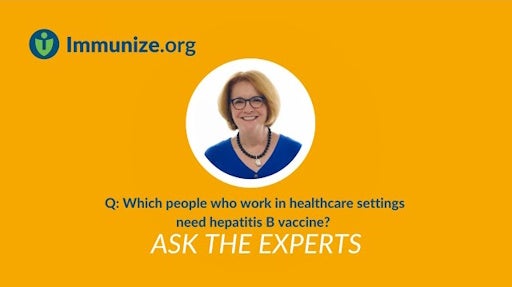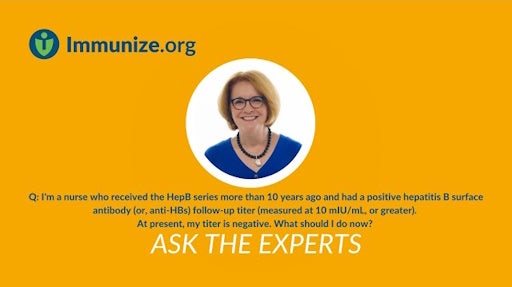No. Immunocompetent people known to have responded to HepB vaccination in the past do not require additional passive or active immunization. Postvaccination testing should be done 1–2 months after the original vaccine series is completed. In this scenario, the initial postvaccination testing showed that the healthcare professional was protected. Substantial evidence suggests that adults who respond to a HepB series (anti-HBs of at least 10 mIU/mL) are protected from chronic HBV infection for at least 30 years, even if there is no detectable anti-HBs currently. Only immunocompromised people (for example, dialysis patients, some people living with HIV) need to have anti-HBs testing performed periodically. Booster doses of vaccine to maintain their protective anti-HBs concentrations to at least 10 mIU/mL are recommended for dialysis patients and may be given to some people living with HIV.
Table 3: Postexposure management of healthcare personnel after occupational percutaneous and mucosal exposure to blood and body fluids, by healthcare personnel HepB vaccination and response status
| Healthcare personnel status |
Postexposure testing |
Postexposure prophylaxis |
Postvaccination
serologic
testing† |
Source patient
(HBsAg) |
HCP testing
(anti-HBs) |
HBIG* |
Vaccination |
Documented responder§ after
complete series |
No action needed |
Documented nonresponder¶
after 2 complete series |
Positive/unknown |
Not indicated |
HBIG x2 separated
by 1 month |
— |
No |
| Negative |
No action needed |
Response unknown after
complete series |
Positive/unknown |
<10mIU/mL** |
HBIG x1 |
Initiate
revaccination |
Yes |
| Negative |
<10mIU/mL |
None |
| Any result |
>10mIU/mL |
No action needed |
Unvaccinated/incompletely
vaccinated or vaccine refusers |
Positive/unknown |
—** |
HBIG x1 |
Complete
vaccination |
Yes |
| Negative |
— |
None |
Complete
vaccination |
Yes |
Abbreviations: HCP = health-care personnel; HBsAg = hepatitis B surface antigen; anti-HBs = antibody to hepatitis B surface antigen; HBIG = hepatitis B immune globulin.
* HBIG should be administered intramuscularly as soon as possible after exposure when indicated. The effectiveness of HBIG when administered >7 days after percutaneous, mucosal, or nonintact skin exposures is unknown. HBIG dosage is 0.06 mL/kg.
† Should be performed 1–2 months after the last dose of the HepB vaccine series (and 6 months after administration of HBIG to avoid detection of passively administered anti-HBs) using a quantitative method that allows detection of the protective concentration of anti-HBs (>10 mIU/mL).
§ A responder is defined as a person with anti-HBs >10 mIU/mL after 1 or more complete series of HepB vaccine.
¶ A nonresponder is defined as a person with anti-HBs <10 mIU/mL after 2 complete series of HepB vaccine.
** HCP who have anti-HBs <10mIU/mL, or who are unvaccinated or incompletely vaccinated, and sustain an exposure to a source patient who is HBsAg-positive or has unknown HBsAg status, should undergo baseline testing for HBV infection as soon as possible after exposure, and follow-up testing approximately 6 months later. Initial baseline tests consist of total anti-HBc; testing at approximately 6 months consists of HBsAg and total anti-HBc.
Source: This table from Prevention of Hepatitis B Virus Infection in the United States: Recommendations of the Advisory Committee on Immunization Practices. MMWR 2018;67(RR-1): 18 www.cdc.gov/mmwr/volumes/67/rr/pdfs/rr6701-H.pdf

